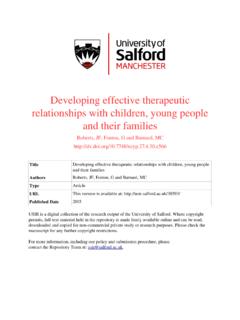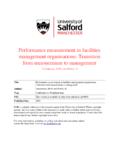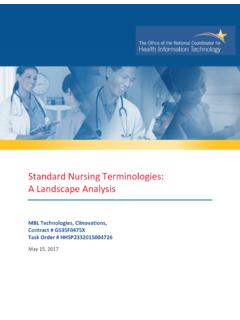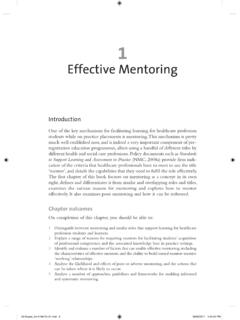Transcription of Developing standardised terminologies to support nursing ...
1 Developing standardised terminologies to support nursing practiceHardiker, NRTitleDeveloping standardised terminologies to support nursing practiceAuthorsHardiker, NRTypeBook SectionURLThis version is available at: Date2011 USIR is a digital collection of the research output of the University of Salford. Where copyright permits, full text material held in the repository is made freely available online and can be read, downloaded and copied for non commercial private study or research purposes. Please check the manuscript for any further copyright more information, including our policy and submission procedure, pleasecontact the Repository Team at: be cited as: Hardiker, N R 2011 ' Developing standardised terminologies to support nursing practice', in: McGonigle, D & Mastrian, K (eds.)
2 , nursing informatics and the foundation of knowledge, Second edition, Jones and Bartlett Publishers LLC, Boston, USA, 7 Developing Standardized terminologies to support nursing Practice Nicholas Hardiker Objectives 1. -Explore the need for consistent terminology in nursing . 2. -Describe the different approaches to terminology development. 3. -Assess initiatives seeking to exploit commonalities among terminologies and to ensure appropriate implementation and consistent use. INTRODUCTION Agreement on the consistent use of a term, such as impaired physical mobility, allows that term to be used for a number of purposes: to provide continuity of care from care provider to care provider, to assure care quality by facilitating comparisons between care providers or to identify trends through data aggregation.
3 Since the early 1970 s, there has been a concerted effort to promote consistency in nursing terminology. Work continues, driven by the following increasing demands placed on health-related information and knowledge: Accessibility: It should be easy to access the information and knowledge needed to deliver care or manage a health service. To be cited as: Hardiker, N R 2011 ' Developing standardised terminologies to support nursing practice', in: McGonigle, D & Mastrian, K (eds.), nursing informatics and the foundation of knowledge, Second edition, Jones and Bartlett Publishers LLC, Boston, USA, Ubiquity: With changing models of healthcare delivery, information and knowledge should be available anywhere.
4 Longevity: Information should be usable beyond the immediate clinical encounter. Reusability: Information should be useful for a range of purposes. Without consistent terminology, nursing runs the risk of becoming invisible; it will remain difficult to quantify nursing , the unique contribution and impact of nursing will go unrecognized, and the nursing component of electronic health record systems will remain at best rudimentary. Not least, without consistent terminology the nursing knowledge base will suffer, both in terms of development and in terms of access, thereby delaying the integration of evidence-based health care into nursing practice. External pressures compound the problem.
5 For example, in the USA, the Health Information Technology for Economic and Clinical Health (HITECH) Act, signed in January 2009, provides a financial incentive for the use of electronic health records; similar steps are being taken in other regions. The HITECH Act mandates that electronic health records are used in a meaningful way this would be problematic without consistent , the current and future landscape of information and communication technologies ( , connection anywhere, borderless communication, Web-based applications, collaborative working, disintermediation and reintermediation, consumerization, ubiquitous advanced digital content, etc.)
6 [van Eecke, da Fonseca Pinto, & Egyedi, 2007]) and their inevitable infiltration into health care will only serve to reinforce the need for consistent nursing terminology while providing an additional sense of urgency. This To be cited as: Hardiker, N R 2011 ' Developing standardised terminologies to support nursing practice', in: McGonigle, D & Mastrian, K (eds.), nursing informatics and the foundation of knowledge, Second edition, Jones and Bartlett Publishers LLC, Boston, USA, chapter explains what is meant by a standardized nursing terminology and lists several examples. It describes in detail the different approaches taken in the development of two example terminologies .
7 It presents, in the form of an international technical standard, a means of ensuring consistency among the plethora of contemporary standardized nursing terminologies , with a view to harmonization and possible convergence. Finally, it provides a rationale for the shared development of models of terminology use; models that embody both clinical and pragmatic knowledge in order to ensure that contemporary nursing record systems reflect the best available evidence and fit comfortably with routine practice. STANDARDIZED nursing terminologies A term at its simplest level is a word or phrase used to describe something concrete, , leg, or abstract, , plan. A nursing terminology is a body of the terms used in nursing .
8 There are many nursing terminologies , formal and informal. nursing terminologies allow us consistently to capture, represent, access, and communicate nursing data, information, and knowledge. A standardized nursing terminology is a nursing terminology that is in some way approved by an appropriate authority (de jure standardization) or by general consent (de facto standardization). In North America, one such authority is the American Nurses Association (ANA), which operates a process of de jure standardization through its committee for nursing practice information infrastructure (CNPII) ( ). While at the time there were obviously many more nursing terminologies in use around the world, in 2010, CNPII had recognized To be cited as: Hardiker, N R 2011 ' Developing standardised terminologies to support nursing practice', in: McGonigle, D & Mastrian, K (eds.)
9 , nursing informatics and the foundation of knowledge, Second edition, Jones and Bartlett Publishers LLC, Boston, USA, the following seven active ( , not retired) nursing terminologies (so-called interface terminologies ): 1. Clinical care classification (CCC) ( ) The clinical care classification (CCC) system consists of two interrelated terminologies that cover nursing diagnoses, nursing outcomes, nursing interventions, and nursing actions. The two terminologies are linked by a common framework of care components. 2. International classification of nursing practice (ICNP) ( ) ICNP is a compositional nursing terminology developed by the International Council of Nurses that covers nursing phenomena ( , diagnoses), nursing actions, and nursing outcomes.
10 ICNP seeks to support the development of local terminologies and facilitate cross-mapping among terminologies . 3. North American nursing Diagnosis Association International (NANDA-I) ( ) NANDA International maintains an agreed set of nursing diagnoses organized as a multiaxial taxonomy of domains and classes. 4. nursing intervention classification (NIC) ( ) The nursing interventions classification (NIC) is terminology that covers interventions performed by nurses and other providers. In common with NANDA, NIC interventions are organized into classes and domains. 5. nursing outcomes classification (NOC) ( be cited as: Hardiker, N R 2011 ' Developing standardised terminologies to support nursing practice', in: McGonigle, D & Mastrian, K (eds.))











